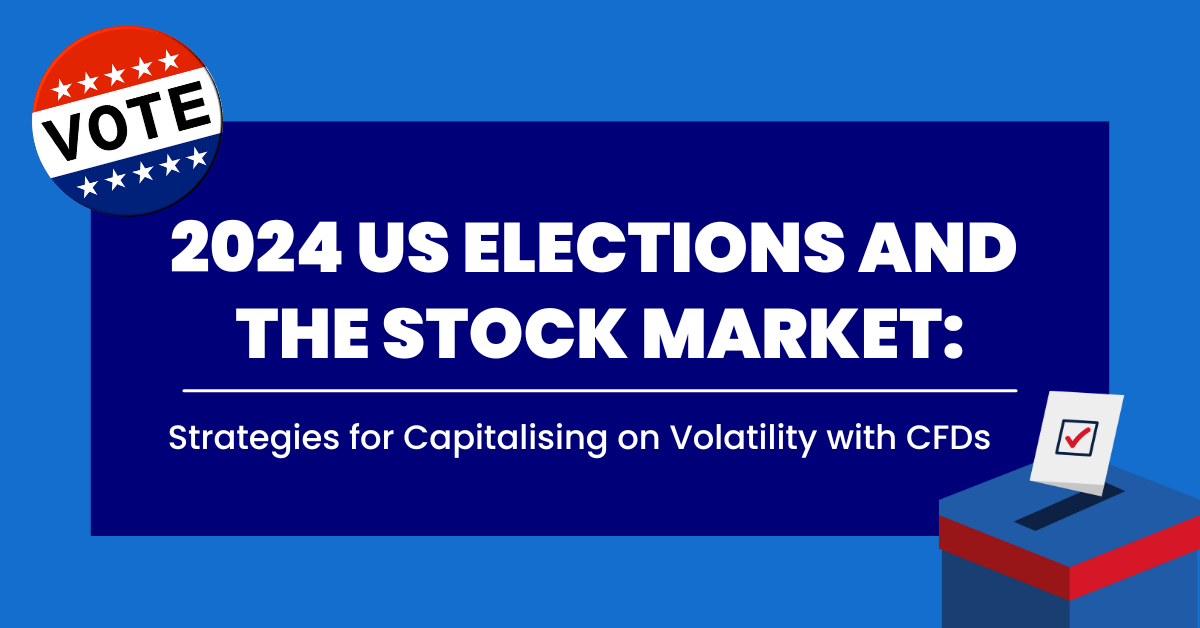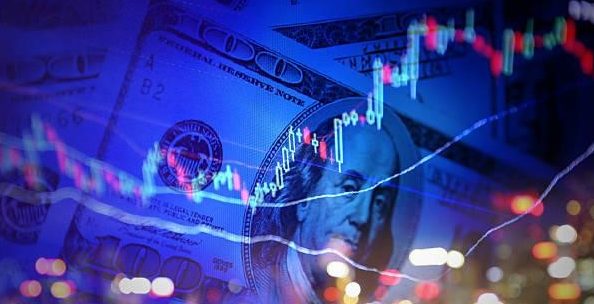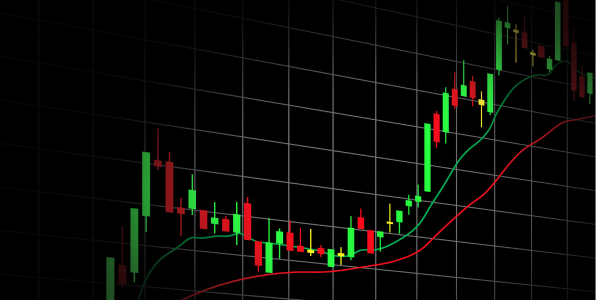2024 US Elections and the Stock Market: Strategies for Capitalising on Volatility with CFDs

Tan Peng Chien, Dealer | Contract for Differences
Peng Chien graduated from the University of London with a Bachelor’s Degree in Banking and Finance. As a dealer, it is essential that he keeps up with all aspects of the markets and therefore spends most of his time exploring new strategies and analyzing the financial markets.
The 2024 US Elections are anticipated to have a substantial impact on the stock market, not only in the general election period but in the months leading up to it. Investors and traders will be closely monitoring the economic policies and agendas of the candidates, the balance of power in Congress, and the broader political landscape to assess how these factors might influence market performance. US pre-market trading could experience heightened volatility. Additionally, financial tools like equity Contracts for Difference (CFDs) offer traders opportunities to benefit from the market uncertainty caused by the elections.

Source: pexels.com
Market Uncertainty and Volatility
Historically, financial markets tend to experience increased volatility as the US elections approach. This is largely due to the uncertainty about future policies on issues like taxes, trade, and regulations. The lack of clarity regarding the direction of government policy can cause investors to adopt a cautious approach, leading to fluctuations in stock prices. In 2024, key issues like inflation, interest rates, and global political tensions are expected to amplify market sensitivity.
The outcome of the 2024 US Elections, which feature a contest between former President Donald Trump and current Vice President Kamala Harris, will shape the economic and regulatory landscape, influencing various sectors such as energy, healthcare, and technology. How the policies of each candidate are perceived by investors will have a direct impact on stock market trends.
Different Economic Policies and Sector Impacts
The 2024 US Elections will likely highlight stark policy contrasts, especially between the Republican and Democratic candidates. Each side has different priorities that will affect specific sectors of the economy.
- Energy
If Kamala Harris were to win, her administration would likely promote green energy initiatives, emphasising investments in renewable sources like solar and wind while imposing stricter regulations on fossil fuels. This could benefit companies focused on renewable energy but negatively impact traditional oil and gas firms. Conversely, under a Trump administration, the emphasis could be on deregulation, which might provide a boost to oil, gas, and other fossil fuel companies. - Healthcare
Healthcare is another pivotal area of divergence. A Harris victory could see the implementation of broader healthcare reforms, which may benefit hospital systems and healthcare providers but could place price pressures on pharmaceutical companies through potential price controls. In contrast, Trump’s policies would likely lean towards maintaining the status quo in healthcare, favouring market-based solutions that may boost pharmaceutical and private insurance companies. - Technology
Both major candidates support the growth of the technology sector, but their regulatory approaches differ. Harris might impose stricter oversight on privacy, data protection, and monopolistic practices, which could lead to increased scrutiny of big tech companies. Trump, in contrast, would likely continue with minimal regulatory intervention, which could be favourable to tech giants and corporate America more broadly.

Congressional Outcomes and Legislative Gridlock
Beyond the presidential race, the composition of Congress plays a crucial role in determining the scope and speed of policy changes. When different parties control the White House and Congress, it often leads to legislative gridlock, which markets generally find favourable because it prevents rapid, sweeping changes. A divided government is perceived as a stabilising factor for investors, as it minimises uncertainty and reduces the likelihood of major policy shifts.
However, if one party secures both the Presidency and control of Congress, it could lead to more aggressive legislative changes. A Democratic sweep might result in higher corporate taxes and increased regulation, which could negatively affect large corporations and financial institutions. A Republican-controlled government could continue pursuing tax cuts and deregulation, which would likely boost corporate earnings and stock prices in certain sectors.
Pre-market Trading and Election Night
US pre-market trading tends to be particularly volatile during election periods. Pre-market hours allow investors to react to overnight news, such as early election results or vote projections, before the official market opens. For example, in the 2020 US Elections, pre-market trading experienced significant fluctuations as election night results came in, reflecting the market’s immediate reaction to potential outcomes.
For the 2024 US Elections, pre-market volatility is expected to be high, especially in scenarios where the election results are delayed or contested. If exit polls or early state results show a clear trajectory for one candidate, the markets may start pricing in the potential impact of that candidate’s policies before the official market opens. On the other hand, uncertainty or legal disputes over the results could cause significant market anxiety, leading investors to shift to safe-haven assets like gold or bonds while moving away from equities.

Trading Election Volatility with CFDs
Contracts for Difference (CFDs) present a flexible tool for traders to profit from election-induced market swings. CFDs allow investors to speculate on price movements without owning the underlying asset, making them particularly useful for short-term trades in volatile environments like the US Elections.
- Exploiting Volatility: The sharp price swings expected during the election period can be capitalised on through CFDs. Traders can go long (buy) if they expect market optimism about a candidate’s policies, or short (sell) if they anticipate a negative market reaction. For example, traders expecting a Trump victory might go long on energy sector stocks, anticipating a regulatory environment favourable to oil and gas companies. Conversely, if a Harris victory seems likely, traders could short fossil fuel companies while going long on renewable energy firms.
- Sector-Specific CFD Trading: CFDs also allow for more targeted sector trading. For example, if it’s believed that healthcare stocks will face headwinds due to regulatory reforms under a Democratic administration, traders can short healthcare-related CFDs. Similarly, those expecting regulatory scrutiny of big tech could use CFDs to hedge against potential losses in that sector.
- Risk Management and Hedging: CFDs are also useful for hedging risks in existing portfolios. Investors who have long-term positions in sectors likely to be negatively affected by election results, such as technology or pharmaceuticals, can use CFDs to hedge those positions by shorting the relevant stocks. This strategy allows investors to mitigate potential losses while retaining their core holdings.
Conclusion
The 2024 US Elections are likely to create significant turbulence in financial markets, especially in the lead-up and immediate aftermath of the election. With key issues like taxes, healthcare, and energy policy at stake, sector-specific market reactions will be driven by the differing economic priorities of the candidates. Pre-market trading is expected to experience considerable volatility as investors respond to real-time election news. Additionally, CFDs provide a flexible trading option for investors looking to capitalise on or hedge against election-related market swings. Given the uncertainty and potential for rapid market movements, traders should implement sound risk management strategies, such as setting stop-loss orders or using hedging techniques to protect their portfolios during this unpredictable period.
How to get started with POEMS

POEMS’ award-winning suite of trading platforms offers investors and traders more than 40,000 financial products across global exchanges.
Trade Smarter and Faster
With our newly launched POEMS Mobile 3 Trading App
Explore a myriad of useful features including TradingView chartings to conduct technical analysis with over 100 technical indicators available!
Take this opportunity to expand your trading portfolio with our wide range of products including Stocks, CFDs, ETFs, Unit Trusts and more across 15 global exchanges available for you anytime and anywhere to elevate you as a better trader using our POEMS Mobile 3 App!
For enquiries, please email us at cfd@phillip.com.sg.
More Articles
Playing Defence: Diversification in Forex Trading
Learn how strategic planning and risk management can help you navigate the highs and lows of the forex market. Don’t miss out on unlocking the secrets to long-term profitability!
From Boom to Bust: Lessons from the Barings Bank Collapse
Did you know that the collapse of Barings Bank in 1995 was from massive losses incurred by a rogue trader? Delve into the tale of how Nick Leeson’s fraudulent investments sent shockwaves through the financial world.
Japan's Economic Resurgence – Unveiling the Tailwinds Behind Nikkei 225’s Record Leap
Discover the driving forces behind Japan’s market surge, delve into its economic performance and learn how CFD products can help you navigate the Japanese market’s volatility via our article!
Disclaimer
These commentaries are intended for general circulation and do not have regard to the specific investment objectives, financial situation and particular needs of any person. Accordingly, no warranty whatsoever is given and no liability whatsoever is accepted for any loss arising whether directly or indirectly as a result of any person acting based on this information. You should seek advice from a financial adviser regarding the suitability of any investment product(s) mentioned herein, taking into account your specific investment objectives, financial situation or particular needs, before making a commitment to invest in such products.
Opinions expressed in these commentaries are subject to change without notice. Investments are subject to investment risks including the possible loss of the principal amount invested. The value of units in any fund and the income from them may fall as well as rise. Past performance figures as well as any projection or forecast used in these commentaries are not necessarily indicative of future or likely performance.
Phillip Securities Pte Ltd (PSPL), its directors, connected persons or employees may from time to time have an interest in the financial instruments mentioned in these commentaries.
The information contained in these commentaries has been obtained from public sources which PSPL has no reason to believe are unreliable and any analysis, forecasts, projections, expectations and opinions (collectively the “Research”) contained in these commentaries are based on such information and are expressions of belief only. PSPL has not verified this information and no representation or warranty, express or implied, is made that such information or Research is accurate, complete or verified or should be relied upon as such. Any such information or Research contained in these commentaries are subject to change, and PSPL shall not have any responsibility to maintain the information or Research made available or to supply any corrections, updates or releases in connection therewith. In no event will PSPL be liable for any special, indirect, incidental or consequential damages which may be incurred from the use of the information or Research made available, even if it has been advised of the possibility of such damages. The companies and their employees mentioned in these commentaries cannot be held liable for any errors, inaccuracies and/or omissions howsoever caused. Any opinion or advice herein is made on a general basis and is subject to change without notice. The information provided in these commentaries may contain optimistic statements regarding future events or future financial performance of countries, markets or companies. You must make your own financial assessment of the relevance, accuracy and adequacy of the information provided in these commentaries.
Views and any strategies described in these commentaries may not be suitable for all investors. Opinions expressed herein may differ from the opinions expressed by other units of PSPL or its connected persons and associates. Any reference to or discussion of investment products or commodities in these commentaries is purely for illustrative purposes only and must not be construed as a recommendation, an offer or solicitation for the subscription, purchase or sale of the investment products or commodities mentioned.
This advertisement has not been reviewed by the Monetary Authority of Singapore.
CFD Promotion Disclaimer
This promotion is provided to you for general information only and does not constitute a recommendation, an offer or solicitation to buy or sell the investment product mentioned. It does not have any regard to your specific investment objectives, financial situation or any of your particular needs. Accordingly, no warranty whatsoever is given and no liability whatsoever is accepted for any loss arising whether directly or indirectly as a result of your acting based on this information.
Investments are subject to investment risks. The risk of loss in leveraged trading can be substantial. You may sustain losses in excess of your initial funds and may be called upon to deposit additional margin funds at short notice. If the required funds are not provided within the prescribed time, your positions may be liquidated. The resulting deficits in your account are subject to penalty charges. The value of investments denominated in foreign currencies may diminish or increase due to changes in the rates of exchange. You should also be aware of the commissions and finance costs involved in trading leveraged products. This product may not be suitable for clients whose investment objective is preservation of capital and/or whose risk tolerance is low. Clients are advised to understand the nature and risks involved in margin trading.
You may wish to obtain advice from a qualified financial adviser, pursuant to a separate engagement, before making a commitment to purchase any of the investment products mentioned herein. In the event that you choose not to obtain advice from a qualified financial adviser, you should assess and consider whether the investment product is suitable for you before proceeding to invest and we do not offer any advice in this regard unless mandated to do so by way of a separate engagement. You are advised to read the trading account Terms & Conditions and Risk Disclosure Statement (available online at https://www.poems.com.sg/) before trading in this product.








